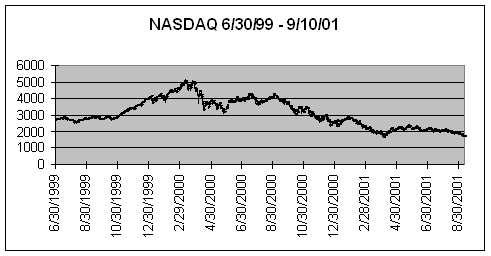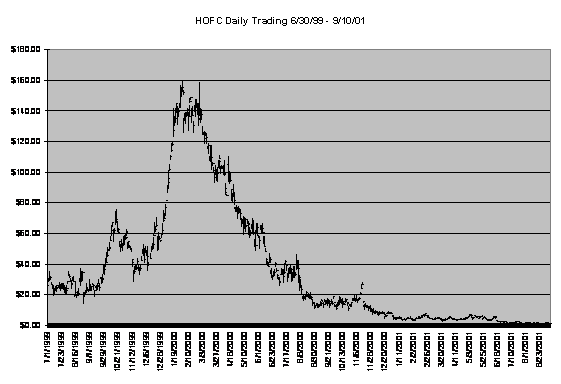Chapter 10: September 11, 2001 - The Half Life of Surprise – Episode 1
Listen to podcast[Note to readers: Chapter 10 is about 9/11/2001. The story is told through contrasts and you may prefer to read it as a complete chapter rather than as a series of daily episodes. If you want to read the whole chapter at once, you will find it in pdf form here. Endnotes detailing what is fiction and what I think is fact in this chapter are posted here on Fractals of Change.]


It is a beautiful prefall morning. A huge high pressure area covers the northeastern United States. The sky is brilliant blue, harder than a summer sky and deeper than winter.
It is deep winter for Internet stocks. Commentators like to say that dotcom is "dot gone". Many Internet companies have simply disappeared. Others are trading at tiny fractions of their highs and way below their IPO prices. The bubble has certainly burst.
Hackoff stock soared during the bubble; its strategy of accepting stock in its customers in lieue of cash payments was lauded as brilliant when these stocks, themselves, were soaring.
Now, with the bursting of the bubble, hackoff's own stock is sinking faster than the market as a whole. The value of its portfolio of customer stock shrinks relentlessly as the bubble deflates.
Each quarter, as the value of its portfolio shrinks, hackoff is forced to write down the value of that portfolio. These write downs result in hackoff's reported profits falling drastically. Moreover, reported sales are down significantly as the dotcom world shrinks and the number of companies with stock hackoff is willing to accept falls.
hackoff reported an operating profit for exactly one quarter, the first quarter of 2000. By the next quarter hackoff is back to reporting operating losses. Quarter after quarter these losses grow. Analysts are predicting that losses will continue to grow. Hackoff's stock has plummeted from its all time high of 159 1/8 to the low hundreds, down though 100, sickeningly below fifty, then unbelievably into single digits.
Now hackoff.com is trading around $1.10 per share. It has sometimes even slipped below a dollar during the trading day but, as yet, has never closed below one dollar. The dollar threshold is particularly important because a stock which trades for a period of time below one dollar gets delisted by NASDAQ. Delisting usually kicks off a further downward spiral in the stock price since it not only carries a stigma but also makes it harder for people to get information about the stock or even to trade it. Relisting is very difficult because the crippled stock must climb above five dollars to requalify.
For most of its history, hackoff's stock has traded well above that of its rival antihack. Antihack always insisted on payment within thirty days in real money for its software. It never took stock in its customers for payment as hackoff did. Hackoff's strategy is now roundly condemned as typical Internet fluff, sometimes by the same people who once called it brilliant. Antihack, once condemned for being stodgy in taking cash rather than stock for its software, is now the preferred investment in the sector. Like all Internet stocks, it has come down from its highs; it once traded above fifty dollars and its IPO, like hackoff's, was at sixteen dollars. Now antihack trades between five and six dollars, well away from the black hole of delisting.
All of this is why Larry Lazard, Donna Langhorne, and Dom Montain are on their way to an 8:00 AM meeting with their archrivals from antihack at the offices of antihack's bankers in the south tower of the World Trade Center. The bankers, at least, would like to merge hackoff and antihack to create a virtual monopoly in hacker protection for e-commerce sites.
#
President George Bush is preparing for a classroom visit to Emma E. Booker Elementary School in Sarasota, Florida. He would like to be remembered as the "education president" and is willing to take on the powerful teachers' unions — which would not have supported him in any case — in order to do what he thinks needs to be done to improve education in the United States. Today the President is a little nervous because he will be reading to the children and he doesn't read out loud very well. His wife, the librarian, would be better at this, but he is a genial man and his geniality usually gets him through such challenges.
#
Many New Jersey first-responders are attending a training convention in Atlantic City. The session beings with a motivational speech.
"You are ‘tower runners' says the speaker, "does anyone know what that means?"
No one does.
He explains: "Several years ago at a college in Texas, a crazed gunman locked himself at the top of a tower in the middle of the campus and began shooting people. Unfortunately, he was a very good shot and there were fatalities. Quite naturally, most people ran as far from the tower as they could get. The exception were the firemen and the law enforcement officers, the people like you. They ran towards the tower so they could end the threat and make everyone else safe. You are tower runners because you run to danger instead of away from it. You put yourselves in harm's way."
#
At about 7:00 AM, Satam al-Suqami is at the American Airlines counter at Logan International Airport in Boston. The clean-cut Middle-Eastern looking man pays cash for a ticket to Los Angeles on Flight 11. Separately, Satam, Whalid al-Shehri, and his brother Wail al-Shehri go through security. They all have box cutters in their carry-on luggage. They have practiced this; they have even made other entrances through this same security gate with their box cutters. The cutters are rarely detected and, in fact, since their blades are less than four inches long, they are permitted aboard flights.
An automatic screening system called CAPPS (Computer Assisted Passenger Prescreening System) selects all three men for extra security scrutiny. The only result of this selection is that their baggage is not placed on the plane until it is confirmed that they, themselves, have boarded. This is in accordance with current procedure.
In the boarding area they see but don't greet Abdu'l-Aziz al-Amari and Muhammad Atta who have flown down from Portland, Maine that morning. Muhammad Atta is their leader and has been to flight school. CAPPS also flags Atta and his baggage is held, but he receives no other special attention.
A similar group of five men check in at the United terminal for Flight 175, also bound for California. They have some trouble at the ticket counter because three of them speak very poor English. The ticket agent has to walk them through the routine security questions before they can affirm that they packed their bags themselves, they are familiar with the contents, they have had them in their possession since packing them, and that no one unknown to them has asked them to carry anything aboard the plane. They pass through security without incident and are not flagged by CAPPS.
#
George Harcourt drops his daughter Emile at preschool on his way to the station. He parks his BMW 750iL in the huge, rapidly-filling lot at the Princeton Junction Station just in time to catch his usual Amtrak Clocker which runs express to Newark. He can see the Towers past the flatness of Newark Airport as the train runs north from Elizabeth. At Newark he changes to the PATH Line, which takes him directly to the subfloors of the World Trade Center.
He has a splendid view from his small office on the 110th floor of the north tower. His west-facing window has the Hudson for its foreground, the old Hackensack train and ferry terminal on the opposite bank, and, on a clear day like today, the rolling hills of New Jersey in the distance. He can also see the Statue of Liberty and newly restored Ellis Island.
George directs an esoteric branch of his firm's bond trading operation. He worked several years to move from a cubicle to an office — but not too long. It was this promotion which allowed him to buy the house in Princeton and move his growing family from the City where his wife never quite felt safe. Once in Princeton, he had to wait eighteen months for a parking spot at Princeton Junction. Currently he is waiting both for a promotion to a larger office and to find out whether his daughter has been accepted to the grammar school in Princeton they would like her to attend.
coming back later, set blookmark here | display next episode now »






